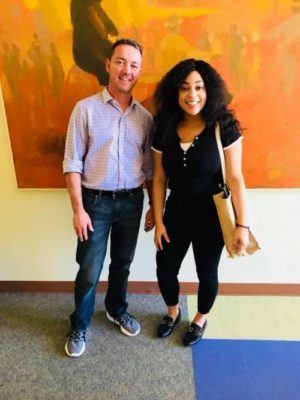

Training communities in the underlying brain science and research behind adverse childhood experiences and childhood trauma has been an essential component to build awareness and shift practices to become trauma-informed. ChildSavers’ John Richardson-Lauve, LCSW, Director of Mental Health and Lead Trauma and Resilience Educator, is one of the key trainers taking the lead on building trauma-informed communities across Virginia. ChildSavers’ mission specifically focuses on supporting those who have experienced trauma.
When John first came to ChildSavers as the Program Manager of the outpatient mental health clinic, he thought, “We are doing a great job in our program, but we are not doing a great job of taking that great work we do, and going outside of the community to provide prevention and education to the communities served.”
About four years ago, the opportunity to expand his work came through a partner that wanted a primer on trauma-informed care. While John was a mental health professional in that space, he did not yet have the expertise to lead a training for other child-serving professionals. John collaborated with Dr. Allison Jackson of Integration Solutions to develop five workshops. John explained the moment he transitioned from the trainee to the trainer saying, “Initially, I was the person sitting in the back of the room taking notes on Dr. Jackson’s training; however, after a last-minute emergency, I transitioned into the person leading that very training!” From then on, the two made a dynamic team! They were able to make cross-referrals to other agencies, and the initiative was widely accepted across the state of Virginia.
When Dr. Jackson accepted an opportunity at a public agency, John became the key trauma trainer through ChildSavers, and with the support of their CEO, L. Robert Bolling, the momentum really began. Now, with Trauma-Informed Community Networks developing across the state, there is a demand for more trainings, and John has been used as a resource from rural communities, like Abingdon, to larger communities like Richmond. John says, “When I first begin trainings, I always asked, ‘how many people in the room know about ACES?’ In the Richmond area, we have done such a great job of really educating people in the community, and I am proud of the work that we have done.”
Their training curriculum impacts cross-cutting sectors: early childhood educators, home visitors, foster care and adoption professionals, mental health professionals, and more. However, in addition to the trainings, there is a large focus on the curriculum itself. John and Dr. Jackson created a five-step outline encouraged by SAMHSA and implemented in various ways.
There are five sections that focus on key topics. Why Trauma Matters covers SAMSHA’s definition of trauma, understanding the basic principles of trauma-informed care, and thinking in a manner that addresses the question, “What happened to you? Instead of, “What’s wrong with you?” Trauma and the Impact on the Brain and Behavior moves into the neurobiology of the brain, and toxic stress as well as trauma and the impact on behavior and cognitive functioning. The latter sections cover Individual Resilience and Community Resilience discusses resiliency in the context of the Attachment Regulation Competency Model. The goals of the training are to send individuals home with the skills to react to trauma in ways that foster socio-emotional learning skills, self-esteem, and confidence on an ongoing basis.
John has trained hundreds of professionals in the community through workshops such as: Train the Trainer, Trauma 101, and the Master Class. In FY17, John trained 5,229 participants in 96 workshops resulting in 258 hours of training alone! In FY18, a total of 8,689 participants were trained over 116 workshops and 373 training hours. Thus far, in FY19 John has already trained 2,883 participants over 22 workshops resulting in 74.5 hours of training.
John has done trainings all over the state from Southside Richmond’s Trauma-Informed Community Network, to Roanoke’s United Way, to the Mt. Rogers Community Service Board, Smyth County’s School Board, and even the Northern Neck’s Eastern Virginia Medical School. Other organizations and individuals are doing the same, which prompts conversations around what kind of curriculums are trainers using, and how do we refine and set a standard of training for all to follow while maintaining flexibility to teach an array of professionals from different disciplines? John stated, “We have to define a common language and a common competency of the basics if we are going to figure out how to work collaboratively together.”
Aleta Lawson, Director of the Head Start Collaboration Office, has partnered with John on a statewide initiative to immerse Trauma Informed Care and Resilience training into Virginia’s early childhood education world. Since 2016, the Head Start Collaboration Office has sponsored six events throughout Virginia, providing training to support more than 700 Head Start Directors, managers, staff, and parents. They have plans to provide additional staff and parent training in the coming months, to ensure full immersion into the local programs. Their vision includes integrating train-the-trainer courses to qualify Head Start staff to lead expansion of trauma-informed care and resilience initiatives with their community partners and continue immersion within their programs. A parent-focused initiative is also in development, designed to support parents in practicing trauma sensitivity and positive behavior interventions, enhancing social-emotional development, and building resilience strategies.
Training of child serving professionals and community leaders has played a critical role in creating a trauma-informed Virginia. To improve the impact of training on childhood trauma, Voices recommends the following:
For more information on trauma-informed initiatives across the state of VA visit our trauma page!
Read More Blog Posts